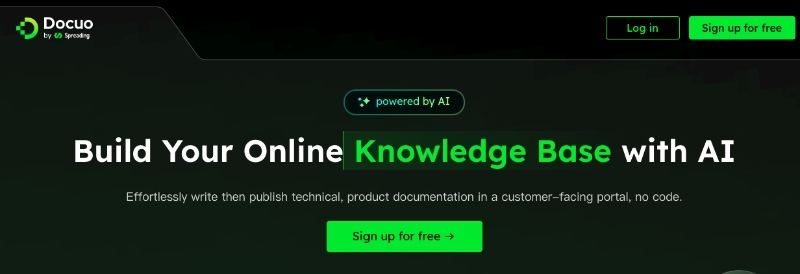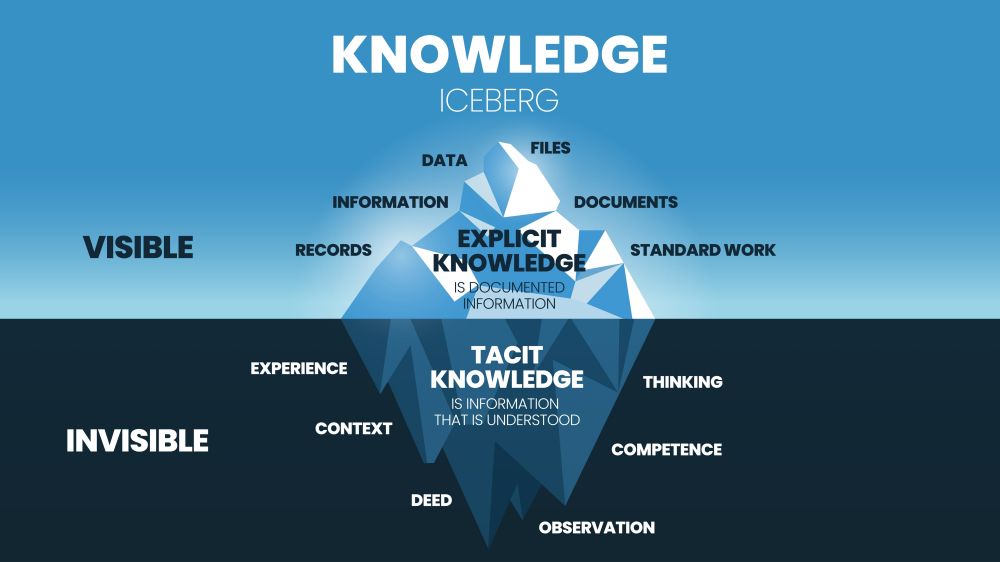It is important to have a good grip on knowledge to plan how to manage, capture, and ultimately share this information with others. This is also important as it can help managers determine their team strengths and transfer knowledge to further train them. Therefore, we have listed different types of knowledge below that illustrate a better idea of these terms.
What are the 10 Types of Knowledge?
A good manager should work to identify the strengths and weaknesses of their employees before assigning them the tasks. In this way, they will be able to find the right way to share knowledge among different employees to encourage collaboration. Therefore, let’s find out the ten types of knowledge in the following section for making the process of identification of capabilities among individuals effortless.
1. Tacit Knowledge
Tacit knowledge is a distinct type of knowledge that you can gain from personal acquaintance and experience. It is an abstract and conceptual form of knowledge you can’t articulate on paper. Notably, people often misinterpret its definition and intermingle it with implicit knowledge. In actuality, it is far different from implicit knowledge, which represents non-communicated and un-documented knowledge.
Additionally, it evolves due to your intuitions and imagination, like an artist who turns his imagination into life with a paintbrush. This knowledge type depends on personal creativity and gut reactions and is not easy to share with others for being exceptional.
2. Posteriori Knowledge
Posteriori knowledge represents a philosophical theory deriving from sensory experiences. This type of knowledge holds logic and scientific backing with justifications using proof and evidence. Besides, you need a strong argument and reason to support your claim for this type of knowledge.
In addition, this empirical-natured knowledge develops after interacting with the physical world with our senses, such as sight, hearing, and touch. Moreover, it is tangible and can be different for having different experiences with the world. If it is raining at your place, it is your empirical knowledge, which is not the same for everyone worldwide.
3. Institutional Knowledge
Institutional knowledge is deployed on the corporate level and is known as organizational knowledge. Collective expertise, experiences, information, and wisdom fall into this knowledge type that can be general or particular to a topic. In specific terms, it includes the basic operations of a company and how its employees work in that environment.
Moreover, institutional knowledge can be implicit or explicit as it is sometimes taught to follow the same patterns or acquired by observing office behavior. The valuable sources of institutional knowledge are employees, the company’s background, documentation, and an organization’s culture.
4. Empirical Knowledge
Empirical knowledge comes from observations and direct sensory experiences that you will not get by searching on a browser. It develops from the understanding of the world and is utilized in scientific research to learn about nature and the physical aspects of the world. You can use this empirical knowledge in medical and social sciences and business.
Moreover, this knowledge type disintegrates itself from posterior knowledge for directly connecting with sensory experiences and observations. For example, if you encounter a cat from a distance, you will perceive it differently. But if you have a cat as a pet, you will observe that it is an animal with certain behaviors and sensory characteristics.
5. Domain Knowledge
Domain knowledge refers to having subject matter expertise and expert knowledge with a deep and particular understanding of a field. This type of knowledge provides valuable insights into a particular subject area and is essential for teachers, professionals, and business experts to excel in their field. Moreover, it enhances with experience and by addressing problems in that subject matter.
For example, you can consider a chemist, cardiologist, pilot, or physics teacher having domain knowledge and showing their best in relevant industries. Besides, it is crucial to have domain knowledge for providing quality outcomes in their respective professions.
6. Cultural Knowledge
Cultural knowledge is all about understanding a particular group of people and a community’s values, norms, traditions, practices, and beliefs. Through cultural knowledge, people accelerate social interactions and avoid misunderstandings and misinterpretations. Subsequently, it boosts diversity and helps gain knowledge of different social aspects and behaviors that shape a society.
Cultural knowledge increases the possibility of expanding the business on a global level. For example, if you have cultural and background knowledge of Japanese, you can develop creative marketing strategies.
7. A Priori Knowledge
Priori knowledge requires no empirical observation or experience and an opposite form of posterior knowledge. It is considered a form of a hypothesis that can be acknowledged or falsified without depending upon sensory perceptions. The case is that it is used in the form of the team’s ability to address the challenges logically.
Also, priori knowledge is universally accepted, self-evident, and analytically true and does not require specific context. A straightforward example of this knowledge is 2+2=4, which is based on mathematical pre-defined rules and does not need sensory submissions.
8. Explicit Knowledge
Explicit knowledge is a type of knowledge that can easily be codified, articulated, and documented on paper. You can easily share explicit knowledge with others as it is easy to use and access. This type of knowledge is usually available in books, databases, manuals, documents, and digital files. It paves the way for doing a job, deciding, or informing your audience about specific facts.
One of the best examples of explicit information in the business sector is a knowledge base. In a knowledge base, companies answer customers’ queries and make FAQs, demonstrative videos, and instructions to use. In this way, users get familiar with the knowledge of a particular company.
9. Procedural Knowledge
As the name suggests, procedural knowledge is the knowledge about the procedure of a task. It basically makes a road map for completing a process involving in-depth knowledge of steps, techniques, and methods. This knowledge is gained through multiple practices and experiences to achieve a particular goal or to complete a specific task.
For example, you can take the example of the learning process of driving a car. In this procedure, you need to have oriented actions, development of skills, and the sequential steps to follow. With best practices in every domain, you will be getting procedural knowledge.
10. Dispersed Knowledge
Dispersed knowledge is one of the different types of knowledge circulated between different sources. Decentralized knowledge is another name referring to the data and expertise spread across different locations, sources, and individuals. This knowledge is equally divided among participants, so no single person can claim to have this knowledge solely.
Movie making is the best-fit example in this scenario where you need a team for its completion. First, you need a scriptwriter, producer, director, actors, videographers, scene directors, and so on. You will be able to accomplish your film by having this accumulated team with different expertise in different fields.
Get Started Building a Knowledge Base with Docuo
Organizations can utilize these different types of knowledge to understand how they can apply their team’s capabilities in different situations. Therefore, managers can create document management systems that can help them store and distribute knowledge. For this purpose, Docuo can provide you with knowledge management features to optimize the documentation process.

Docuo quickly creates documentation and a knowledge base that can help solve various industrial issues. Moreover, it consolidates tasks and removes work blockage with great efficiency. So, make use of this efficient AI management tool to streamline your knowledge base management.


